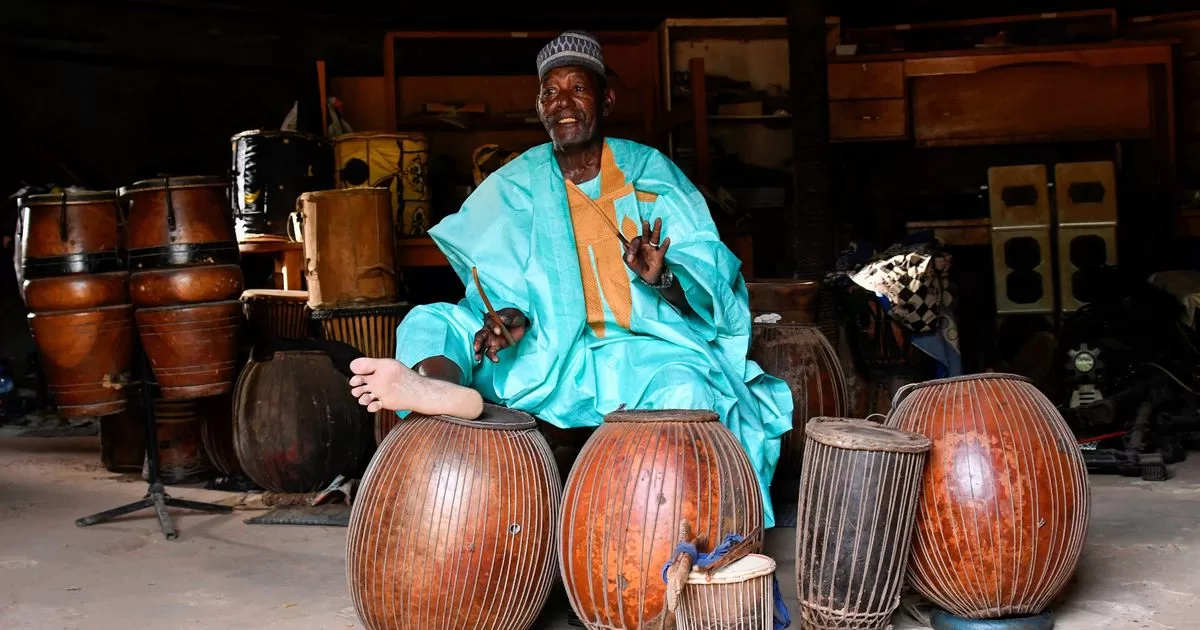NIAMEY.- From inside a darkened hut, a succession of low and high-pitched taps resounds, singing a call in the Hausa language: a Nigerian musician sends a traditional telegram with drumbeats. “You see? You’ve heard his name,” enthuses Oumarou Adamou, alias Maidouma, one of the musicians most famous traditional Nger and great maestro del douma, a percusin instrument typical of Hausa heritage.
Maidouma modulates the frequency of the sound by swinging his bare foot on the goatskin membrane of the drum.
Few now understand this coded language. Young Nigeriens, followers of rap and electronic music, forget this knowledge.
During a demonstration, Adamou wears his sky blue boubou and becomes Maidouma again. His eyes light up and he starts playing his favorite percussion instruments. “Good luck! Good luck! Long live! God is great!” he says while playing.
An ambassador of Nigerien music around the world, Adamou is now the guardian of the Center for Musical Training and Promotion (CFPM), a government institution founded in 1989 in Niamey.
Heritage in danger
Very few curious people come to visit his ‘museum’, a round house in a corner of the CFPM where he has a collection of percussion, string and wind instruments, saved from the 2011 fire in the national museum.
“Our traditional music instruments are in danger of disappearing, today’s young people want to play modern instruments, such as the guitar and drums,” deplores Adamou.
Although the elite of Nigerien traditional music is usually found among the ocher buildings of the CFPM, the masters of douma, kalangou, gouroumi and molo are becoming old and rare. Their instruments, along with their ancestral rhythms and meanings, risk disappearing with them.
“How many artists rehearse here? It’s over, they’re all gone,” laments Yacouba Moumouni, alias Denk Denk, famous singer and flute master.
The lack of financing hinders all preservation projects in a country classified among the poorest in the world, where people under 25 years of age make up 70% of the population.
The diplomatic tensions between the military authorities and the West since the July 26 coup d’état bode poorly for the world of culture, which has benefited from foreign financing. But the problem is deeper and the diagnosis of the deans is unanimous: impatient young people prefer to compose on a computer rather than undergo a long and poorly paid apprenticeship.
Musical vocations are also blocked by the rise of a rigorous Islam, as well as by a caste system that reserved musical performance for griots (African minstrels), who now have an unfavorable image.
“We don’t see griots like we do in Mali or Senegal. In Niger, if you are a griot, you are a bit vulgar for society,” Moumouni explained.
Poverty
Contrary to Mali or Nigeria, the traditional music of Niger did not know how to open up to other world music and modernize, considered Mahamane Sani, an artist and educator. For this reason, since 2018 he has organized workshops aimed at young people from poor areas, where they learn to play and make traditional instruments.
A few steps from the instrument museum, in a CFPM classroom, a dozen students learn to play the gourimi, a string instrument of Hausa origin.
Covered in a white veil, Aichata Adamou strums the strings carefully. “If I manage to sell even a single gourimi, this workshop will have been a benefit for us,” said the young woman.
Some students from previous editions have pursued musical careers, others found work in the musical instruments and performing arts company founded by Mahamane Sani.
In addition to finding employment for these young people, the objective is: “to open their eyes, so that they understand what they can earn and what being bearers of those ancestral values brings them,” said Sani.
His message resonates among young people who reclaim their identity.
“We imitate people from outside, but we have our own instruments, why not work on them?” asked Oumarou Abourahamane, a young rapper who participates in the workshop.
All of this reinforces the optimism of Oumarou Adamou, who aims to train “young volunteers from all regions of Niger” in 2024, finances permitting.
“Good luck, good work, long live!” Maybe Maidouma and his instruments haven’t stopped talking.
FUENTE: AFP



